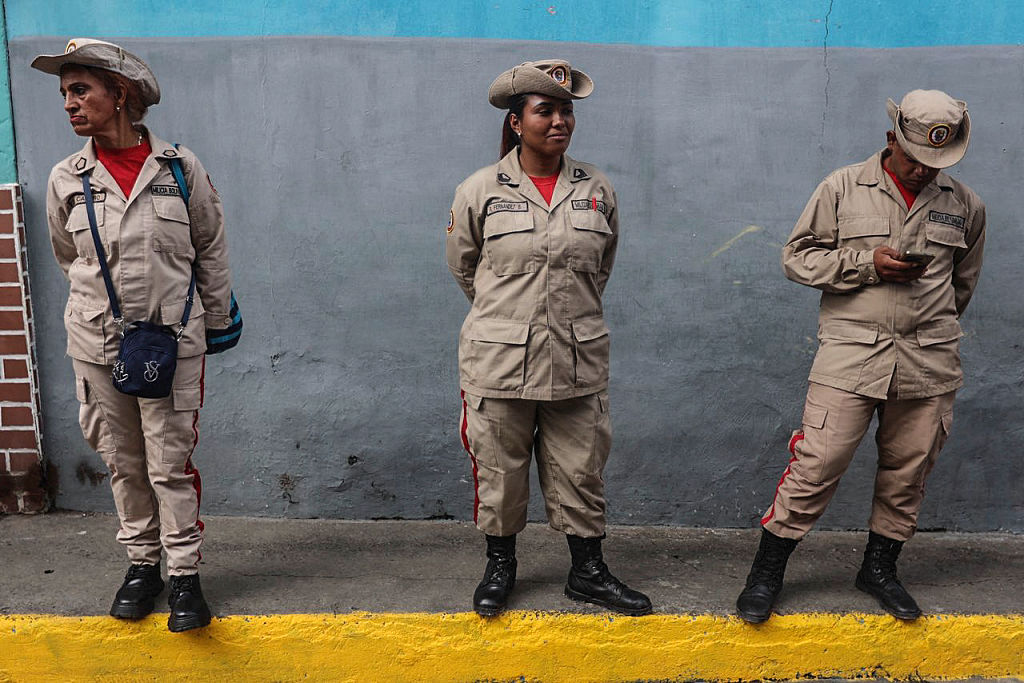The U.S. and Venezuela appear to be heading towards a standoff with neither country indicating a willingness to back down.
The Venezuelan government on Monday mobilized more than four million militia troops seemingly in response to reports of U.S. naval movements in the region.
“We defend our seas, our skies, and our lands. We liberated them. We guard and patrol them. No empire will touch the sacred soil of Venezuela, nor should it touch the sacred soil of South America,” Venezuelan President Nicolás Maduro said in a televised address Monday.
[time-brightcove not-tgx=”true”]
Three U.S. Navy missile destroyers have been deployed to the waters off Venezuela, U.S. officials told Reuters on Monday.
“President Trump has been very clear and consistent. He’s prepared to use every element of American power to stop drugs from flooding into our country and to bring those responsible to justice,” White House Press Secretary Karoline Leavitt said Tuesday.
Here’s what to know about the state-of-play between the U.S. and Venezuela.
Trump and Maduro have had longstanding hostilities
Washington and Caracas broke off formal bilateral diplomatic relations in 2019 during Trump’s first term, after Trump backed opposition leader Juan Guaidó in the Latin American country’s presidential election. The U.S. government has not recognized Maduro’s last two electoral victories, and the Trump Administration has repeatedly called Maduro’s presidency illegitimate, including as recently as Tuesday.
“I know it very well, and Venezuela is right now being run by a dictator,” Trump said in August last year, as he blamed the country for the flow of criminals and drugs into the U.S. and campaigned to crack down on it.
Democratic former Presidents Barack Obama and Joe Biden also opposed the Maduro government, which has suggested jailing its opposition and has deported American journalists. During Trump’s first term, the U.S. imposed financial sanctions on Venezuela in 2017, 2018, and 2019. In 2020, Maduro was indicted in a New York federal court on charges of narco-terrorism, conspiracy to import cocaine, and other charges. And the tensions between Trump and the Venezuelan leader have only escalated during Trump’s second term.
Earlier this month, the Trump Administration doubled the reward to $50 million for information leading to Maduro’s arrest. The Administration also accused Maduro of being “one of the world’s largest drug traffickers” and the head of the so-called Cartel of the Suns, allegations that the Venezuelan government has rejected. The U.S. also alleged links between Maduro and Mexico’s Sinaloa Cartel, which Mexican President Claudia Sheinbaum said earlier this month her government has no evidence of. Attorney General Pam Bondi said that the U.S. government had seized up to $700 million of assets with alleged links to Maduro on Aug. 13, including luxury goods, bank accounts, and private jets.
Trump has pushed to use the U.S. military to scuttle cartels. In February, he designated Venezuela’s Tren de Aragua, as well as six groups in Mexico and MS-13 in El Salvador, as foreign terrorist organizations. The President signed a secret directive to the Pentagon to use military force against these cartels, sources told the New York Times earlier this month.
The Administration has sought to counter the inflow of drugs, especially fentanyl, through tariffs, such as imposing tariffs on Canada, China, and Mexico, citing the countries’ “failure” to stop fentanyl smuggling into the U.S. And Trump issued penalty tariffs on countries that buy oil from Venezuela in March, highlighting the threat of Tren de Aragua to the U.S.
Trump has also targeted Venezuelans on immigration issues, revoking the protected status of hundreds of thousands of Venezuelan immigrants in the U.S. and deporting 238 Venezuelans in March to an El Salvadoran prison as part of a mass deportation campaign claiming to target alleged gang members. U.S. courts have ordered the return of several of those who were wrongfully deported, while many other deportees reject the allegations against them.
Trump sends missile destroyers to Venezuelan waters
On Monday, the U.S. government ordered three U.S. Navy missile destroyers—USS Gravely, USS Jason Dunham and USS Sampson—and around 4,000 military personnel to the edge of Venezuela’s territorial waters, according to Reuters. The Administration confirmed to CNN last week that it had ordered naval movements as part of an effort to stymie drug trafficking.
The Trump Administration is also committing additional military assets in the broader region within international airspace and waters, including several P-8 spy planes, warships, and an attack submarine, an official told Reuters.
Venezuela mobilizes millions of militia fighters
“This week, I will activate a special plan with more than 4.5 million militiamen to ensure coverage of the entire national territory—militias that are prepared, activated and armed,” Maduro said Monday.
The Venezuelan Militia was created in 2005 by the late President Hugo Chávez and formally established in 2010.
Maduro’s plan will involve mobilizing peasant and worker militias “in all factories and workplaces in the country” and providing “missiles and rifles for the working class, to defend our homeland,” the Venezuelan President said Monday. Maduro called U.S. threats “rotten rehashes” and “extravagant, bizarre, and outlandish.”
The Venezuelan government also temporarily banned the purchase, sale, and operation of drones in Venezuelan airspace on Tuesday. A drone laden with explosives detonated near Maduro in 2018 in an apparent assassination attempt, which resulted in the arrest warrants for more than two dozen people, including one who later died under mysterious circumstances, and the convictions of 17 people, including opposition leader Juan Requesens.
“Washington’s accusing Venezuela of drug trafficking reveals its lack of credibility and the failure of its policies in the region,” Venezuela’s foreign ministry said in a Tuesday statement. “While Washington threatens, Venezuela advances firmly in peace and sovereignty, demonstrating that true effectiveness against crime is achieved by respecting the independence of the people. Every aggressive declaration confirms the inability of imperialism to subdue a free and sovereign people.”

